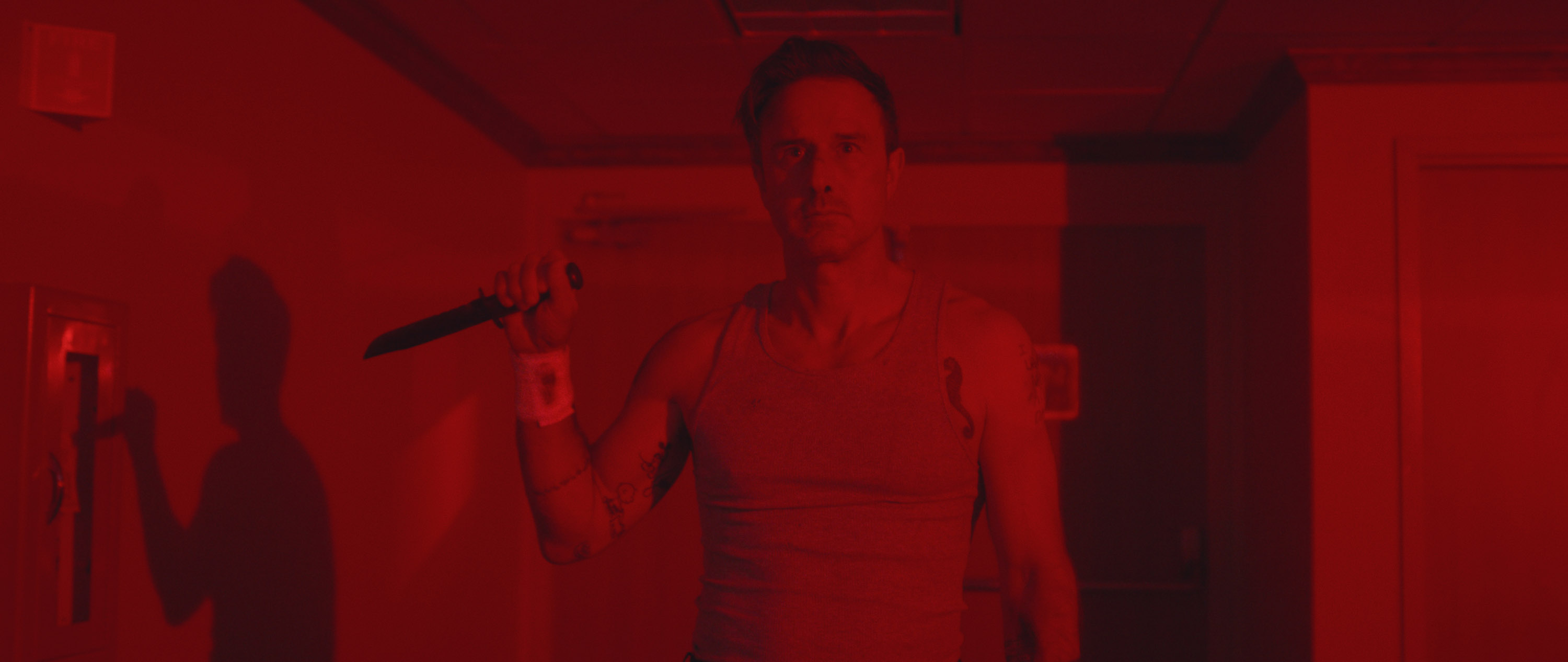What to Watch Verdict
'12 Hour Shift' is an ode to blundering criminals that sustains levels of B-movie engagement in support of zaniness, foolhardiness, and the charms of nurses in gore-slick gowns.
Pros
- +
💉 Proper seedy tone.
- +
💉 In-tune performances.
- +
💉 The fun of black market murder.
Cons
- -
💉 Requires full commitment to structure.
- -
💉 Budget shows in small doses.
When I think about Steven Soderbergh ensembles, or Coen Brothers kerfuffles, I spot shared DNA within Brea Grant’s 12 Hour Shift. Those humorously contained comedies packed with errors, dimwits, and dumb luck that masquerades as cleverness (or, nah, owns its dumbness). Grant steps behind the camera with confidence and command over B-movie chaos, embracing the boneheaded charms of her slice-and-snatch tomfoolery. An overnight murder spree involving hideous rattails, Mick Foley, and tasteless grocery store sheet cakes is, admittedly, sillier rather than solely suspenseful. Maybe that’s a no-no for some, but in my book, Grant delivers southern gangland corruption with the smarts of Ricky Bobby. That’s a compliment.
Angela Bettis stars as Mandy, an Arkansas overnight nurse who moonlights in the organ trading business. Regina (Chloe Farnworth), her cousin, arrives for their latest pickup arrangement but makes a fatal error. Regina presents kingpin Nicholas (Mick Foley) with an empty cooler, no kidney, which brings her back to Mandy’s hospital in search of fresh organs. Thus begins the longest shift of Mandy’s career, as the hours descend into consequential anarchy at the hands of collection thugs, dunderheaded bag blondies, and a suicidal serial killer (played by David Arquette). In the words of a rightfully disbelieving patient’s daughter, “what kind of hospital is this?”
For invested enjoyment, your mindset needs to be along for the ride that is 12 Hour Shift. In a sane world, none of the proceedings should be allowed to happen. In Grant’s world? It’s 1999, on the cusp of Y2K, which means police forces are distracted by their “Y2K task force” initiatives. Regina can play “Little Miss Murder Queen” without any outside interjections, as corpses pile everywhere but the facility’s morgue (er, well, except one). Male characters find themselves too smitten by the women currently harvesting patient insides even to notice they’re aiding in illegal organ trades. The hospital is a battleground, where coincidence and ridiculousness are common to a degree that could irritate more logic-driven viewers.
What benefits 12 Hour Shift is Grant’s simplicity in character design, never overdrawn as redneck stereotypes outside of believable archetypes (within the ecosystem of 12 Hour Shift). Angela Bettis’ face-read exhaustion as she cleans Regina’s mess amidst seventy billion other obstacles is, in itself, a translation of our agape mouths over general unexplainables. Chloe Farnworth’s air-headed, self-absorbed hottie proves how she could misplace not one, but two organ containers while dabbling in mass murder (Farnworth selling bits like “sexy distraction dances” while covered in puke and blood). No character ever feels superfluous, only adding to complications. Nikea Gamby-Turner’s criminal parter and boss over Mandy, Tom DeTrinis as a nosy hypochondriac who haunts the lobby while demanding treatment, David Arquette’s death row inmate now wandering free, the whole roster.
As Mandy’s exploits become more gruesome, Grant grounds the comic value. For example, when rail-thin Mandy (who couldn’t lift 25-pound dumbbells) has to hoist a hefty corpse onto the steel table. Mandy’s frustration and wits-endedness are where pitch-dark humor exists. Grant never needs to exaggerate Mandy struggling to budge the dead body, because leaning too hard into the slapstick would become overbearing. Instead, we’re treated to Mandy’s massaging of a male cop’s ego by stroking his hand with a bloody glove that somehow doesn’t raise enough red flags. This scene exemplifies Grant’s calmer approach while her winding narrative connects Mandy to overdosed patients, stabs hitmen with hypodermic needles, and sees an elderly, disoriented patient beat that same hitman in defense of “her friend” (Regina, who is very much not).
If 12 Hour Shift sounds like one of those “none of this should make sense” calamities, you’re correct. Brea Grant’s grandest trick is scripting medical malpractice insanity and somehow stitching together an otherwise messy (surgically speaking) collection of bad-gone-worse moronics. It’s not the fine-dining equivalent of sophisticated underworld intrigue, but the greasy-spoon variety that serves genre comfort that’s humble, comforting, and “cooked with love,” so to speak. Between Angela Bettis’ long-drag-on-a-cigarette resting state and all the thorns in her side, there’s a lot to love despite sequences that don’t precisely mask the low-budget nature of an otherwise put-together caper. Stupid is as stupid does in the context of a chuckle-worthy midnighter about haplessness, illegalities, and bumbling thrills that’ll get you through just fine.
You can also read our Fantasia Fest review of 12 Hour Shift here.
12 Hour Shift will be available on VOD October 2nd, 2020.
The latest updates, reviews and unmissable series to watch and more!
Matt Donato is a Rotten Tomatoes approved film critic who stays up too late typing words for What To Watch, IGN, Paste, Bloody Disgusting, Fangoria and countless other publications. He is a member of Critics Choice and co-hosts a weekly livestream with Perri Nemiroff called the Merri Hour. You probably shouldn't feed him after midnight, just to be safe.


